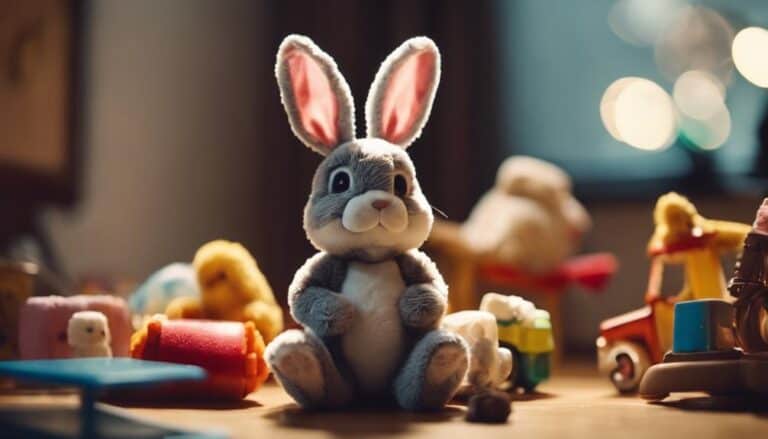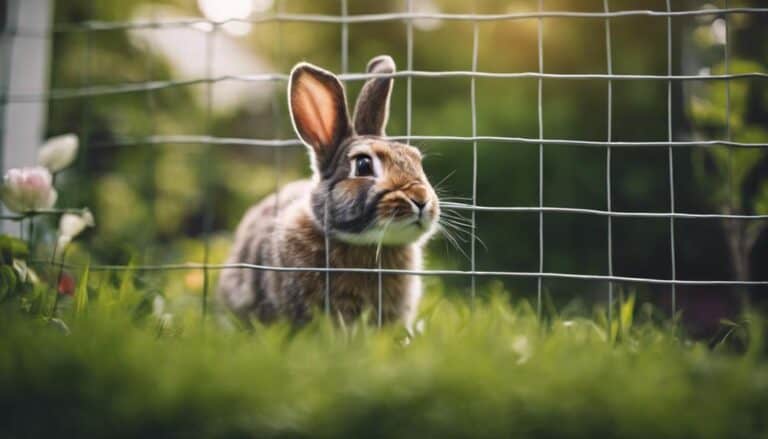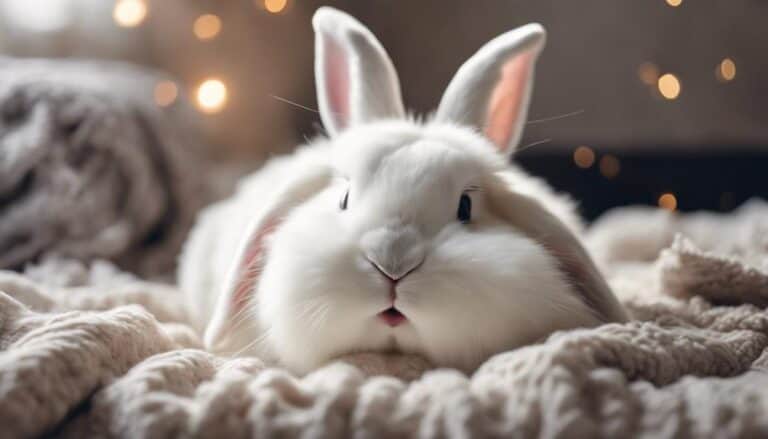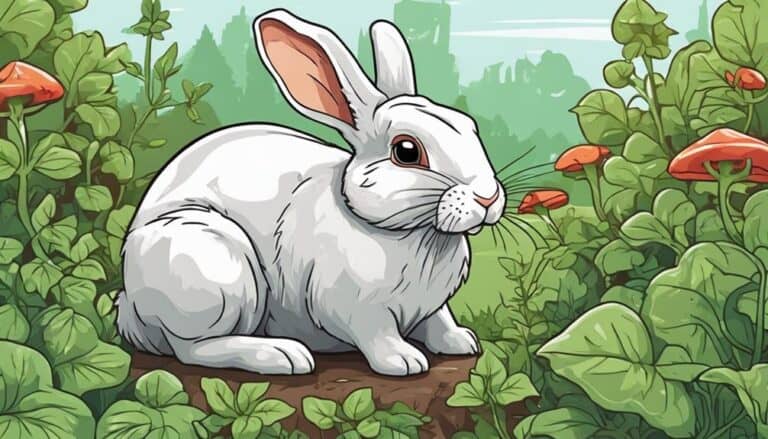Did you know that chocolate can be extremely harmful to bunnies? While you may enjoy indulging in this sweet treat, it's important to understand the risks it poses to your furry friends.
The effects of chocolate on rabbits can be alarming, and the consequences of ingestion are severe.
Before you consider sharing a piece of chocolate with your bunny, it's vital to explore the potential dangers and learn how to keep your pet safe and healthy.
Contents
- 1 Key Takeaways
- 2 Potential Risks of Chocolate for Bunnies
- 3 Toxicity of Chocolate to Rabbits
- 4 Symptoms of Chocolate Poisoning in Bunnies
- 5 Treatment for Chocolate Ingestion in Bunnies
- 6 Monitoring Bunny Health After Chocolate Consumption
- 7 Alternatives to Chocolate for Bunnies
- 8 Educating Bunny Owners on Chocolate Awareness
- 9 Frequently Asked Questions
- 10 Is Pineapple Safe for Bunnies to Eat if Chocolate is Not?
- 11 Conclusion
Key Takeaways
- Chocolate is toxic to bunnies due to theobromine and caffeine.
- Even small amounts of chocolate can lead to severe health issues.
- Symptoms of chocolate poisoning in bunnies require immediate vet intervention.
- Educating bunny owners on chocolate dangers is crucial for bunny well-being.
Potential Risks of Chocolate for Bunnies

Avoid feeding chocolate to your bunny due to the potential risks associated with this treat. Chocolate contains theobromine and caffeine, which can have severe consequences for rabbits. These substances can lead to seizures, heart issues, and respiratory failure in rabbits.
Additionally, the high sugar content in chocolate is hard for rabbits to digest and can contribute to obesity, a common health issue in pet rabbits. Even small amounts of chocolate can be harmful to rabbits, especially considering their relatively small size and weight.
Both white and dark chocolate can cause stomach problems, obesity, and digestion issues in rabbits. Since chocolate lacks fiber, it isn't suitable for rabbits and should be kept out of their reach to prevent accidental ingestion. Ensuring your bunny's diet is free from chocolate will help maintain their health and well-being.
Toxicity of Chocolate to Rabbits
Feeding chocolate to your bunny can pose serious health risks due to the toxic substances like theobromine and caffeine it contains. Chocolate is highly toxic to rabbits as their bodies can't efficiently metabolize theobromine and caffeine, leading to potential seizures, heart issues, and respiratory failure. Additionally, the high sugar content in chocolate can be challenging for rabbits to digest, increasing the risk of obesity.
Even small amounts of chocolate can be harmful to rabbits, taking into account their small size and weight. Both white and dark chocolate pose a threat to rabbits, causing stomach problems, obesity, and difficulties in digestion. Due to the lack of fiber and the potential for severe health complications, chocolate should never be considered a suitable treat for rabbits. It's important to prioritize your bunny's well-being and avoid exposing them to substances that are known to be toxic to their delicate systems.
Symptoms of Chocolate Poisoning in Bunnies
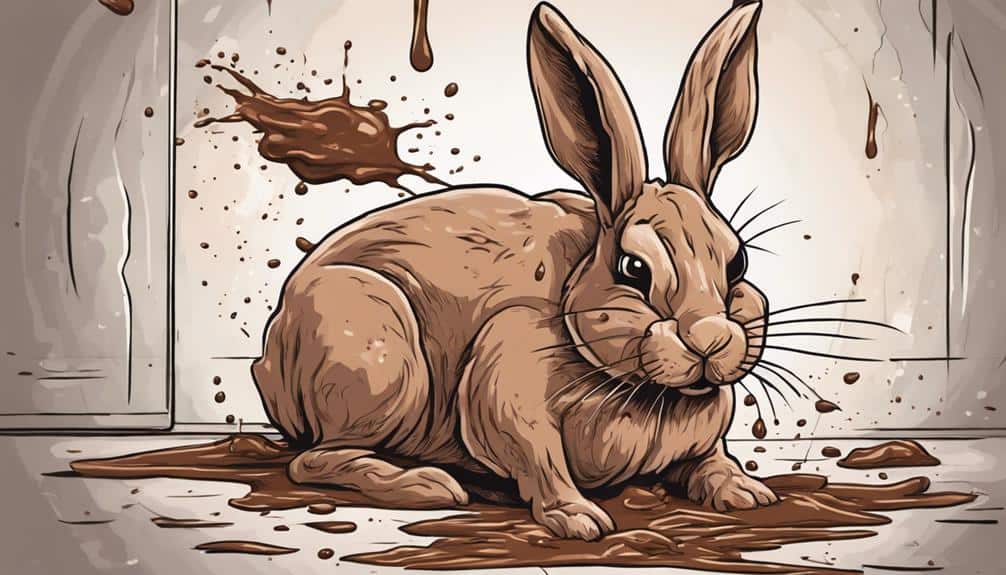
Symptoms of chocolate poisoning in bunnies can manifest as diarrhea, vomiting, and tremors. It's imperative to recognize these signs promptly to seek appropriate care for your furry friend. Here are some key symptoms to watch for:
- Diarrhea: Keep an eye out for changes in your bunny's stool consistency or frequency.
- Vomiting: If your bunny starts vomiting, especially after ingesting chocolate, it could be a sign of poisoning.
- Tremors: Notice any unusual shaking or trembling in your bunny's body, as this could indicate chocolate toxicity.
- Seizures and Heart Issues: In severe cases, chocolate poisoning can lead to seizures and heart problems in bunnies.
Treatment for Chocolate Ingestion in Bunnies
If your bunny has ingested chocolate, inducing vomiting isn't an option, and a stomach tube might be necessary for chocolate extraction. The fat and sugar in chocolate can cause intestinal issues in rabbits, emphasizing the need for immediate veterinary intervention.
Regular vet check-ups are essential post-chocolate ingestion to make sure your bunny's health is closely monitored and follow-up care is optimized.
Chocolate Toxicity Symptoms
In cases of chocolate ingestion in bunnies, immediate veterinary intervention is essential to address potential toxicity symptoms. If your bunny has consumed chocolate, here are common signs to watch for:
- Diarrhea
- Vomiting
- Tremors
- Seizures and heart issues in severe cases
Monitoring your bunny closely post-ingestion is vital. Remember, blood tests can help detect any adverse effects of chocolate consumption. Stay vigilant and seek immediate veterinary care if your bunny displays serious symptoms.
Immediate Vet Intervention
Immediate veterinary intervention is essential when a bunny ingests chocolate to prevent potential toxicity. Veterinarians may utilize stomach tubes to remove chocolate from a bunny's specialized digestive system. This immediate action is critical in minimizing the absorption of toxins from the chocolate candy.
Following the initial treatment, regular monitoring and follow-up vet visits are recommended to guarantee the bunny's well-being. Chocolate ingestion in bunnies can result in multi-organ disease and failure if not addressed promptly. Blood tests can aid in detecting any adverse effects caused by the chocolate ingestion.
Preventive Measures for Rabbits
To safeguard your bunny's health and well-being, it's important to implement preventive measures to avoid potential chocolate ingestion risks. Here are some essential steps to protect your rabbit:
- Store chocolate securely out of reach of your bunny.
- Be cautious when consuming chocolate around your rabbit, as they may try to snatch a bite.
- Regularly inspect your living areas for any dropped chocolate or wrappers.
- Educate yourself and others in your household about the dangers of chocolate ingestion for rabbits.
Monitoring Bunny Health After Chocolate Consumption
Watch for symptoms like diarrhea, vomiting, tremors, seizures, or heart issues in your bunny after chocolate consumption. Remember, immediate veterinary attention is vital if severe symptoms emerge.
Monitor your bunny closely for a few days post-chocolate ingestion to guarantee their health and consider blood tests to detect any potential adverse effects.
Chocolate Toxicity Symptoms
When monitoring a bunny's health after consuming chocolate, it's essential to be vigilant for symptoms of chocolate toxicity such as diarrhea, vomiting, tremors, seizures, and heart issues.
Here are some key signs to watch for:
- Diarrhea: Look for loose or watery stools.
- Vomiting: Keep an eye out for any regurgitation of food.
- Tremors: Notice any shaking or trembling in your bunny's body.
- Seizures: Be alert for uncontrolled movements or convulsions.
Veterinary Care Recommendations
After a bunny consumes chocolate, it's important to closely monitor their health for any signs of chocolate toxicity. If your rabbit ate chocolate, watch for symptoms like lethargy, diarrhea, vomiting, or tremors.
Pay attention to changes in their eating, drinking, and defecating habits post-chocolate consumption. It's essential to seek immediate veterinary care if your rabbit shows any abnormal symptoms or distress after ingesting chocolate.
To aid in moving the chocolate through their system, offer hay, romaine lettuce, and cilantro. Keep a close eye on your rabbit's behavior and overall health for a few days to guarantee their well-being post-chocolate ingestion.
Remember to avoid feeding chocolate to your bunny to prevent such risks in the future.
Recovery and Monitoring
Following a bunny consuming chocolate, close monitoring for symptoms like diarrhea, vomiting, and tremors is essential to guarantee their well-being. Here are some important points to bear in mind during the recovery and monitoring process:
- Immediate Veterinary Attention: Seek help promptly if severe symptoms occur post-chocolate ingestion.
- Blood Tests: These can aid in detecting any adverse effects of chocolate poisoning in bunnies.
- Watch for Seizures or Heart Issues: These signs may indicate chocolate toxicity in bunnies.
- Regular Vet Visits: Recommended for ongoing monitoring of the bunny's health after exposure to even a small amount of chocolate.
Alternatives to Chocolate for Bunnies
For rabbits seeking suitable alternatives to chocolate, exploring fresh vegetables, herbs, and Timothy hay can provide essential nutrition and fiber. While chocolate is harmful to bunnies due to theobromine, caffeine, and high sugar content, there are plenty of safe options to feed your furry friend.
Fresh vegetables like carrots, bell peppers, and leafy greens are excellent choices to supplement your rabbit's diet. Herbs such as cilantro, parsley, and basil can add variety and flavor while being safe for consumption. Timothy hay is a vital component of a rabbit's diet, providing the necessary fiber for proper digestion.
These alternatives not only keep your bunny healthy but also make sure they receive the essential nutrients they need to thrive. Remember, chocolate should never be given to rabbits as it can lead to severe health problems. By offering a balanced diet rich in fresh vegetables, herbs, and Timothy hay, you can keep your bunny happy and healthy for years to come.
Educating Bunny Owners on Chocolate Awareness
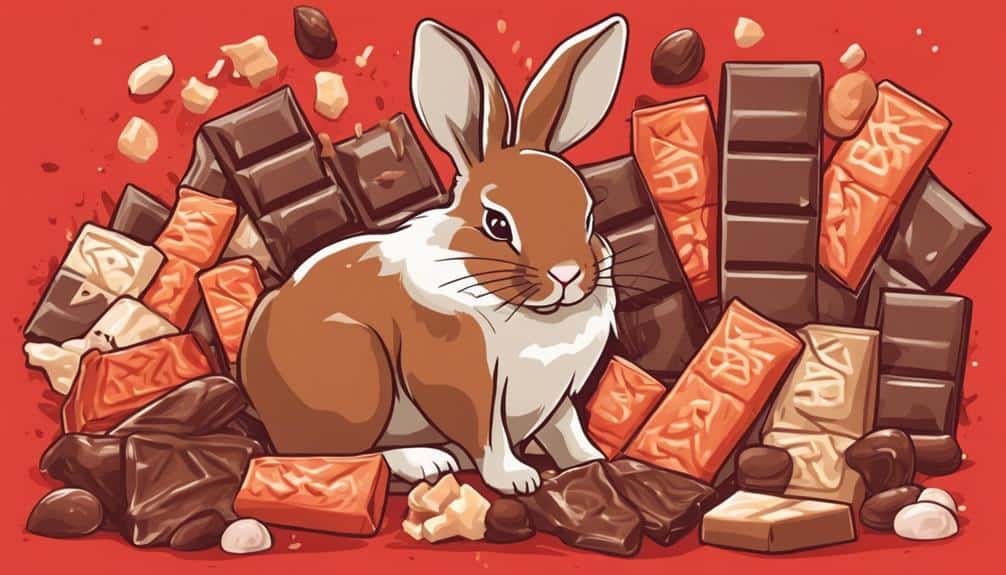
To guarantee the well-being of your beloved bunnies, it's important to educate yourself and fellow bunny owners on the dangers of chocolate ingestion. Rabbits need your attention and care to make sure they stay healthy and safe. Here's what you need to know:
- Chocolate Toxicity: Chocolate contains theobromine and caffeine, harmful to bunnies causing seizures, heart issues, and respiratory failure.
- Even Small Amounts Are Harmful: Digestive issues, obesity, and potential toxicity can result from minimal chocolate consumption.
- Sweet Attraction: Rabbits are drawn to the smell and sweetness of chocolate, so remove all chocolate products from their reach.
- White vs. Dark Chocolate: White chocolate is less toxic but high in sugar, while dark chocolate poses higher risks due to increased theobromine content.
Educating yourself and others on these risks is important. Remember, immediate vet intervention is necessary if your bunny ingests chocolate. Be proactive and remove the chocolate from your bunny's environment to keep them safe and thriving.
Frequently Asked Questions
What Happens if My Bunny Eats Chocolate?
If your bunny eats chocolate, it's important to act fast. Chocolate toxicity can lead to seizures, heart problems, and more. Seek emergency vet care immediately if you notice symptoms like rapid breathing or digestive issues.
Can Rabbits Lick Chocolate?
Absolutely avoid letting bunnies lick chocolate. Chocolate toxicity can severely harm rabbits due to theobromine and caffeine content. Bunny behavior may draw them to chocolate, but safeguard their health by keeping it far away.
What Is Toxic to Rabbits?
Avoid feeding rabbits any toxic foods such as avocado, chocolate, and raw rhubarb. Be cautious of plant toxicity and household dangers. Prevent digestive issues by steering clear of potatoes, oatmeal, iceberg lettuce, and silverbeet. Stick to a high-fiber diet with Timothy hay.
What Sweets Can Rabbits Eat?
When considering sweets for rabbits, opt for fruit treats and carrot sticks over sugary items. These healthier options can provide your furry friend with essential nutrients without risking stomach issues. Choose wisely for your rabbit's well-being.
Is Pineapple Safe for Bunnies to Eat if Chocolate is Not?
Yes, bunnies and pineapple consumption can be safe. While chocolate is toxic to bunnies, pineapple is a safe and delicious treat for them. The high water content and natural sugars in pineapple make it a healthy snack option for bunnies. Just ensure it’s served in moderation to prevent digestive upset.
Conclusion
So remember, even though bunnies may seem tempted by chocolate, it's important to never give in to their begging. Chocolate can have serious and harmful effects on their health, potentially leading to toxicity and even death.
By being aware of the risks and choosing safe alternatives, we can guarantee our furry friends stay healthy and happy.
Your bunny's well-being should always come first, so keep the chocolate away and opt for bunny-friendly treats instead.

